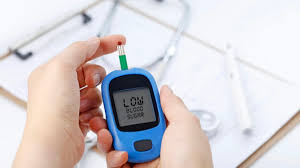
Top Things That Increase the Diabetes Risk

Pre-diabetes
Impaired glucose tolerance or impaired fasting glucose, prediabetes is the number one risk factor leading to type 2 diabetes -and more than 86 million people have it. People with prediabetes have blood glucose levels above normal, but not high enough to be diagnosed as diabetes. he good news is you can delay or even prevent developing type 2 diabetes with moderate exercise and weight loss.
Skipping Breakfast
Forgoing your morning meal not only tends to backfire, making you ravenous by late morning, but can also create the perfect storm for type 2 diabetes. When you deprive your body of food, insulin levels are disrupted, making it harder to control blood sugar.
Low Birth Weight
Your baby might be able to predict your risk for diabetes later in life. Researchers think there's a genetic link between low birth weight in newborns and the development of diabetes in their fathers. the genes in the father that predispose him to diabetes also cause low birth weight in his child, as those same genes are passed to his baby. Fathers of babies who fall into the lowest 20 percent of birth weights had a 180 percent increased risk of diabetes, even if they weren't diabetic when the child was born. Babies with low birth weight also have a higher risk of developing the disease themselves if their fathers not mothers have diabetes.
Don't get enough sun exposure
It's important to protect yourself from the sun's harmful cancer-causing rays, but shunning sunlight entirely may put you at risk for diabetes. People with vitamin D deficiency are more likely to have type 2 diabetes and prediabetes, regardless of their weight. Researchers believe the sunshine vitamin plays a role in the proper functioning of your pancreas, which produces insulin and helps It's important to protect yourself from the sun's harmful cancer-causing rays, but shunning sunlight entirely may put you at risk for diabetes. People with vitamin D deficiency are more likely to have type 2 diabetes and prediabetes, regardless of their weight. Researchers believe the sunshine vitamin plays a role in the proper functioning of your pancreas, which produces insulin and helps regulate blood sugar. So take a supplement to boost your levels, as well as eating foods rich in the vitamin, like salmon and vitamin D-fortified milk or cereal.
Smoking
Smokers have up to a 40% higher chance of developing type 2 diabetes than non-smokers. And the more you smoke, the higher your risk. Smoking also makes controlling the disease-both type 1 and type 2 diabetes more difficult. Quitting smoking at any time will benefit your health immediately, but the sooner you quit, the better, both for controlling your blood glucose levels and for your overall well-being.
Pesticides
Possibly a new reason to go organic, pesticides have been linked to an increased risk for diabetes, particularly type 2. Many researches shows pesticides were associated with a more than 60% increased risk of developing diabetes. More research is still needed, but in the meantime, consider reducing your exposure to pesticides as much as possible.
Antibiotics
Taking numerous antibiotics has been linked to type 2 diabetes. People who filled two to four antibiotics prescriptions within the past 15 years had a 23 percent higher risk for diabetes. Those who received five or more courses of antibiotics had a 53 percent higher risk of developing the disease. Researchers interpret their findings in two ways: that antibiotics raise the risk of type 2 diabetes, or that people who eventually develop the disease are more prone to infections, leading them to need more antibiotics before they're diagnosed.
Gestational Diabetes
Close to 10% of pregnant women develop gestational diabetes, a condition in which a non-diabetic woman develops diabetes during pregnancy. In most cases, it's temporary, it shows up around 24 weeks and then goes away after the baby is born. However, your risk goes up for developing pre-diabetes or type 2 diabetes later in life.
Microwave Leftovers in Plastic
A good reason to purge your collection of takeout containers: Reheating food in them might increase your risk of developing diabetes. Researchers found that two chemicals used in the manufacturing of plastic wrap and plastic takeout containers were associated with an increased risk of diabetes in children and teens. The chemicals were found to increase insulin resistance, a precursor to diabetes, as well as elevated blood pressure.
Your Diet is Light on Probiotics
The risk of diabetes increases when you have more bad bacteria than good bacteria in your gut. Your stomach needs good bacteria, called probiotics, for proper digestion; low levels can lead to inflammation that may eventually lead to insulin resistance. Eat foods like yogurt, sauerkraut, and some cheeses for a probiotic boost. These are the best foods for good gut bacteria.
Polycystic Ovary Syndrome
Another risk factor for women is polycystic ovary syndrome (PCOS), a condition that can result in irregular periods, no periods, painful periods, infertility, and increased levels of testosterone. PCOS causes high glucose levels, and women with PCOS often also have insulin resistance, a condition in which the body makes insulin but doesn't use it effectively. If you have PCOS or suspect you might, visit your doctor to be tested for diabetes.
Depression
Depression has been linked to diabetes and multiple other chronic illnesses. There's no definitive evidence about why there's a connection, but one theory is people with depression may find it difficult to take care of their health. Eating well and exercising may not be a priority for someone who is experiencing depressive symptoms. Managing this illness is an important step to improving both your emotional and physical health, including reducing your risk of diabetes later in life.


